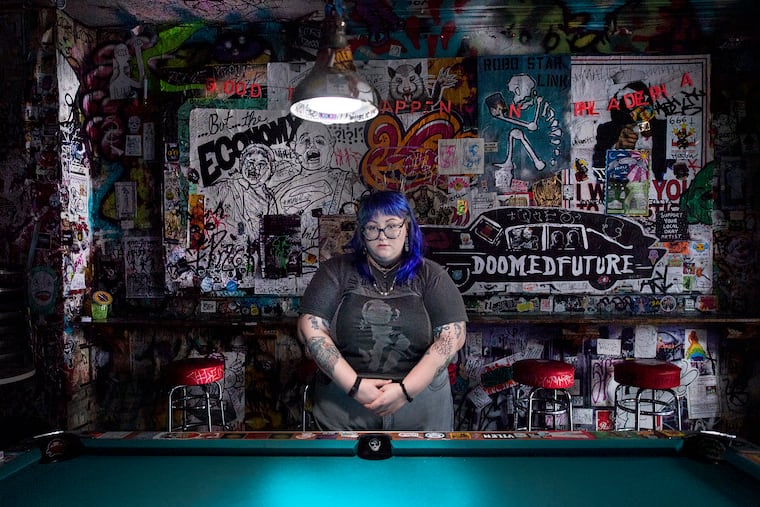Gun violence is ‘not a one-time event.’ Each new incident compounds past trauma
I've been surrounded by gun violence my whole life. No one talks about the repetitive damage that has on survivors, or how trauma compounds trauma.

I am a survivor of gun violence. If you live in the United States, chances are you’ve experienced gun violence too, or you will at some point in your life. And for survivors, the devastation continues long after everyone else has moved on.
With mass shootings and gun violence on the rise, every new experience is an opportunity for re-traumatization. This is what happened to me after the shooting on South Street that took place in June.
I work at Tattooed Mom, just three blocks from where the shots started, and was heading home when someone texted me to say what happened. That night, in a moment of panic, I did the only helpful thing I could think of: I compiled a list of mental health and violence prevention resources, and I tweeted them from the TMoms account. Just as quickly as I sent it, replies started coming in, sharing support and love. Over the next few days, I saw the list I made being shared by friends, businesses, organizations, and public figures.
But there was nothing special about what I did. As a survivor of gun violence, this was my trauma response. When faced with the spiraling, suffocating, and insurmountable fear that survivors know all too well, I simply did what I wish someone had done for me after my first experience with gun violence: I urged people to seek professional help.
My first brush with gun violence happened when I was too young to remember my own age. A man my mother was dating punched her hard from behind, and she hit the ground like a body bag. I didn’t understand that she wasn’t dead, only knocked out, and in a moment of panic, I clenched my tiny fists and started punching the man’s thighs. He pulled out a gun and pointed it right between my eyes. I stared back at him with hate, fear, and other emotions I had never felt before. What happened next is a series of muddled memories until I remember snapping back into my body, driving with my mother. We were alone in the car together, and silent.
“My first brush with gun violence happened when I was too young to remember my own age.”
By the time I hit 15, I had several more run-ins with gun violence. When I was growing up in Akron, Ohio, the back window of my family’s van was shot out. People were killed outside my apartment. My cousin tried to take a gun to school.
I was also indirectly affected by gun violence inflicted on those close to me. Over time, my father became my primary caregiver, and when I was 12, he attended a concert in Columbus, Ohio, where a man stormed the stage and shot the guitar player in the head. Chaos erupted, and my dad rushed two audience members to safety, listening to screams and additional shots from the next room over. Four people died that night.
After a horrific weekend in Philadelphia, we hear about injuries, fatalities, and cries for gun control, but eventually people’s focus shifts to another issue or incident. No one talks about the repetitive damage that gun violence has on survivors, or how trauma compounds trauma.
» READ MORE: Every shooting is ‘horrific.’ Not just on South Street.
But I get it — I didn’t talk about my history with gun violence until I started attending regular therapy sessions at age 19. Shortly after, I started encouraging my dad to go, too. The experience of therapy was eye-opening: I had no idea how much of our lives had been consumed by the fallout of gun violence. My dad always sits in a chair facing the exit, no matter where we are. He taught me how to break someone’s nose if I ever needed to escape a dangerous situation in close quarters. I take antianxiety medication.
Gun violence is not a one-time event. Once you experience it, you never, ever get to stop.
Every news story and every bullet is a visceral reminder of all the bullets I’ve seen before. I once worked at a venue that told the staff to lie on the floor and pretend to be dead in the case of an active shooter. As a survivor of gun violence, I’ve spent too much of my life pretending — most often, pretending to be fine. And as shots rang out on South Street, I forced myself to pretend to be OK because I knew that everyone involved wouldn’t be OK for quite some time.
I don’t want to pretend anymore, and I don’t want anyone else to have to, either. We need to talk about how hard it is to experience gun violence, and how traumatic it is to live in a society that cannot solve this epidemic. We need to talk about how gun violence disproportionately harms Black, Indigenous, and other people of color. We need to talk about how inaccessible our health-care system is, and how necessary reform is for survivors. We need to talk about how it’s OK to not be OK.
Yes, I knew what to do when I re-experienced gun violence earlier this month. But I don’t want to live in a world full of people who are prepared to deal with gun violence. I want to help build a world without it.
Sarah Cowell is an artist, creator, and curator living in South Philadelphia with their partner, David, and their pet axolotl, Griffin.